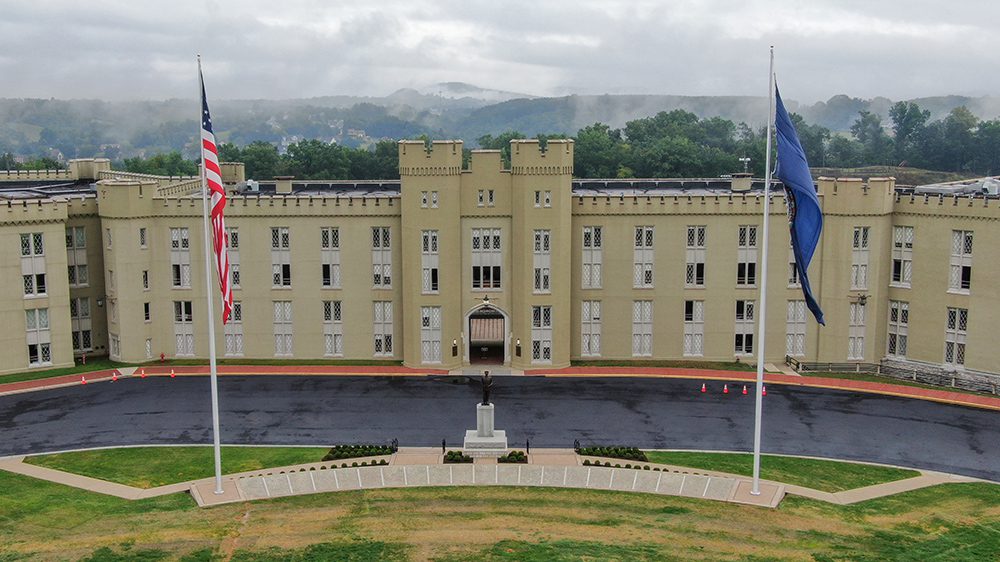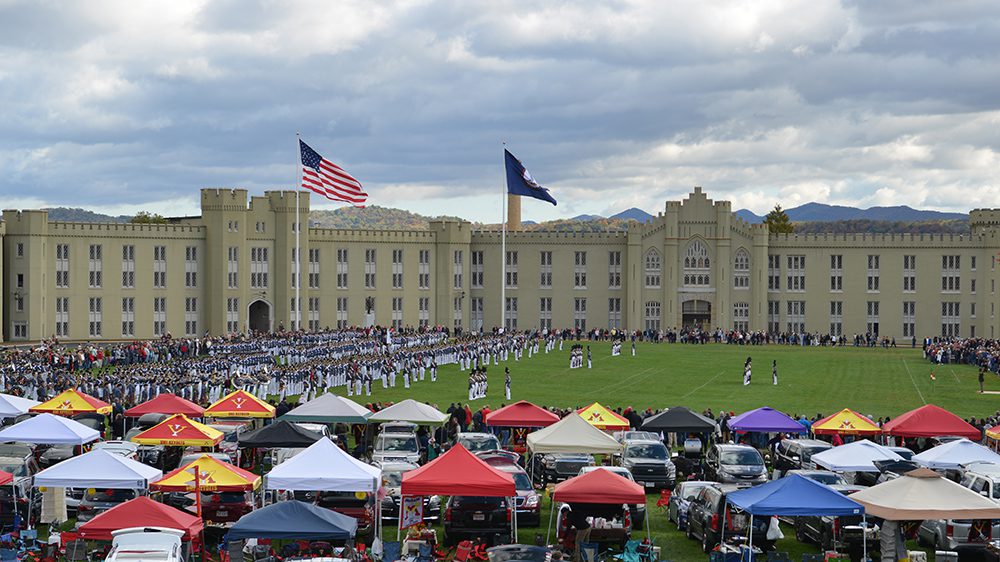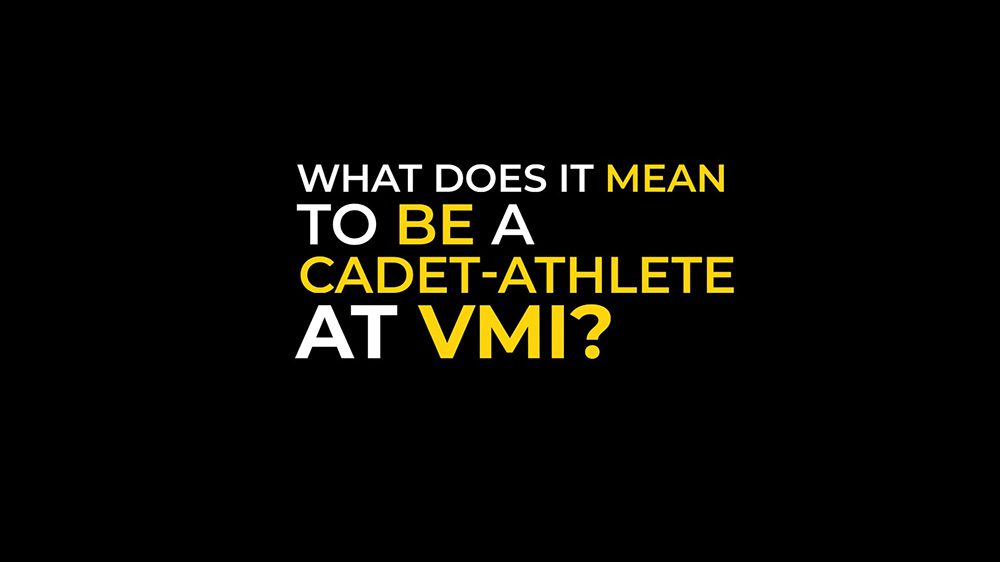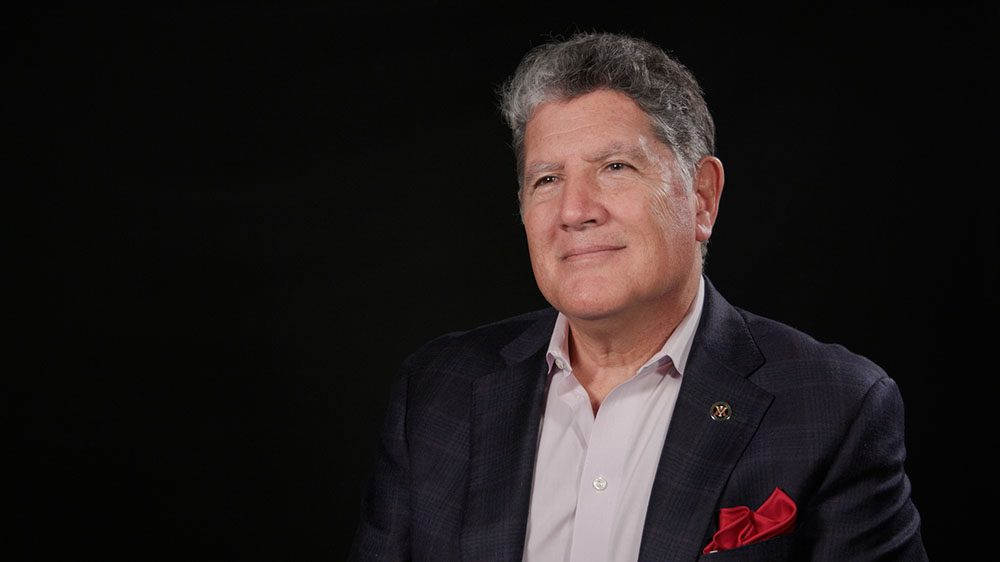The leadership of the VMI Alumni Agencies changed July 1, 2023. Ernesto V. Sampson Jr. ’98 succeeded Thomas H. Zarges ’70 as VMI Foundation president, and Danny Thornton ’78 became VMI Keydet Club president, succeeding Bland Massie ’77. He also took the post of VMI Alumni Agencies Board of Directors president. Anthony Moore ’78, VMI Alumni Association president since 2022, continues to serve on the Agencies board.
All three alumni have been involved with the Alumni Agencies for quite some time. For Moore, this is the second time he has served as a director of the Alumni Association. He first joined in 1989, filling an unexpired term, and continued to serve two more terms. “I was thrilled to work with honored alumni like Frank Louthan ’41, Paul Maini ’66, and Jeff Morgan ’80, addressing the day’s issues,” said Moore. Moore returned to the board in 2015 and has chaired two committees—New Cadet Recruiting and Nominating—and was the Alumni Association’s second and first vice president before becoming president last year.
Sampson’s interest in the VMI Foundation stemmed from his experience as a cadet and as a member of the VMI Board of Visitors from 2011–15. “I remember Colonel Tim Golden ’71 [longtime director of financial aid] telling me that VMI would never let cadets leave because they couldn’t pay tuition,” he said, “and it could make that promise because of the VMI Foundation.” The Foundation’s function as the steward of the money that supports the Institute and cadets intrigued Sampson from that moment on.
Sampson’s time on the BOV sharpened his interest. “There, I had a 360-degree view of how the Institute works. You realize how the administration runs a tight ship, and you gain an appreciation for all the good work VMI does every day.” He also came to appreciate private support’s importance. “I learned how critically important it is to every aspect of the cadet experience.” According to Sampson, that knowledge and experience “gives me—as a trustee—an excellent perspective on how the Foundation can be the most helpful.”
Thornton’s cadet experience led him to first becoming a donor to the Keydet Club and then joining the Keydet Club Board of Governors in 2009. “My relationship with athletics was extremely positive,” he recalls. “I knew a lot of Division I athletes, and I was roommates with some, too.” His cadetship coincided with a successful time for VMI athletics. The football team won the Southern Conference Championship in 1977, and the basketball team twice went to the NCAA tournament. “The joy athletics brought to the Corps as well as alumni and friends was tremendous,” he said. “I wanted to bring that back.”
Yet, for Thornton, there is something equally important involved. “As a scholarship donor and Keydet Club governor, I have had relationships with cadet-athletes and been thrilled to watch them progress from anxious rats to accomplished and polished graduates.”
All three men have been involved in the recent changes in the structure and functions of the Alumni Agencies, which have had several positive effects. “In the past, there were too many duplicating functions, too much overlap,” said Thornton. Sampson agreed, “The Agencies were working in silos. Alumni would receive a fundraising appeal from one organization and, a week or two later, an appeal from another. It was inefficient and led to some alumni feeling harassed.”
Moore described the change’s effects, “Each agency has a specific mission, and the reorganization allows them to accomplish their tasks in a coordinated fashion. The relationships between the agencies have improved, and we will continue to enhance those relationships.”
“VMI remains in the business of graduating honorable citizen-soldiers, and our country needs them more than ever. So, what could be a better place to give money?”
Ernesto V. Sampson Jr. ’98, VMI Foundation president
Asked to consider the future of their specific organization and the Agencies in general, they offered specific goals. For Moore, the traditional tasks of the Alumni Association remain, as he describes it, “to organize alumni into one general body, keep alive the memories of Institute life, and help the Institute succeed in its mission.” To that end, the Association helps organize the alumni through reunions, regional and chapter events, and events on post.
He focuses on the work done by chapters. “Whether it’s a luncheon for senior alumni, a happy hour for younger alumni, an event related to a sports activity, or a picnic that everyone can enjoy, our chapters must provide opportunities for alumni to strengthen their bonds with each other and VMI. Chapters must also assist in the traditional activities that help VMI succeed, such as recruiting new candidates to attend VMI, representing VMI at college fairs, and attending rat send-offs.”
Therefore, Moore said, the Association will focus on assisting chapters organize events that attract VMI’s diverse alumni population. For example, it is updating the Chapter Operations Guide to include examples of activities that increase participation. “We’ll also help chapters to develop succession plans which will allow more alumni to participate in their operations and ensure success over the long term.”
“The Keydet Club is poised for a bright future,” replied Thornton. “The Board of Governors are fully engaged, and we have adopted a committee system that promises improvements in our overall performance.” He is just as optimistic about the Agencies. “The Agencies are all about unity and clarity. Our message is that all alumni must be united around what VMI is doing, that is educating young people to go forth and make a difference. We are clear that we are doing all we can to contribute to that mission and that more alumni need to take part in our efforts.”
Sampson’s goal for the VMI Foundation and the Agencies is ambitious. “General Peay [’62] often expressed his goal for VMI to have $1 billion endowment. I believe we can get there through effective management and continued alumni support.” But Sampson has another admittedly “lofty goal:” making a VMI education free. “I’d love to see us in a position to cover the tuition and fees of every cadet. That would ensure VMI can compete for the best young people with some of America’s finest colleges and universities.”
Going forward, he says, the Agencies need to keep alumni and friends engaged with a simple message. “VMI is just as demanding of a college as it ever was. It remains the harder choice, but offers amazing rewards for those who make it,” is how Sampson expresses it.
For more than two decades, the Agencies’ priorities have included communicating the nature of their work to the VMI family. The fact remains, however, that some of its aspects are not readily apparent. Asked what one of them might be, Moore replied, “Some might be surprised how closely we work with the Board of Visitors and the administration. Frequently, the Institute asks volunteer leaders of the Agencies to provide input from an alumni perspective to committees, work groups, and task forces on post. Still, there is an important distinction between assisting the Institute and governing the Institute. We do the former; the Board of Visitors does the latter.”
Sampson points to VMI Investment Holdings, LLC. “Since 2009, with the help of a well-known investment-management firm, this organization, which is made up of alumni experienced in finance who serve seven-year terms, has ensured the endowments that support VMI are managed prudently so VMI has the private financial support it needs to maintain excellence in every aspect of its comprehensive education.” Serving on its board since 2019, Sampson noted that, under this management system, the endowment has grown from $234 million in Fiscal Year 2009 to $702 million in Fiscal Year 2023.
Another question posed to the presidents was what they would tell alumni who asked why they should become involved with VMI as volunteers and donors. Moore responded, “It is essential to increase alumni participation in chapter activities, whether on leadership boards or helping with or participating in events. It is at this level that alumni can make significant contributions to their fellow alumni and VMI.” He also pointed out that such participation “provides opportunities to learn about the activities of the Board of Directors, let us know how we can better serve alumni, and to be recognized as a candidate for the board.”
Sampson said, “VMI remains in the business of graduating honorable citizen-soldiers, and our country needs them more than ever. So, what could be a better place to give money?”
“If you’re not a supporter of VMI, you are missing out on an opportunity to get a feeling of joy,” replied Thornton. “I have often said I get more out of giving to VMI than VMI might get out of my donations. It is a blessing to give in support of such fine young people as our cadets and, by doing so, develop a special relationship with them.”
-

Scott Belliveau '83 Communications Officer - Executive Projects
The communications officer supports the strategy for all communications, including web content, public relations messages and collateral pieces in order to articulate and promote the mission of the VMI Alumni Agencies and promote philanthropy among varied constituencies.




